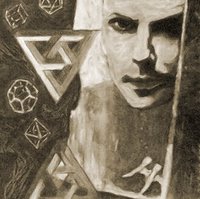Quote for the day
The Greek word for truth, aletheia, incorporates the word for "forgetting"; a-letheia might be translated as "unforgetting" or "remembering". This etymology is particularly significant in Plato's epistemology, which maintains that true knowledge can be achieved only through anamnesis, the soul's recollection of the Forms it has glimpsed during its circuit through heaven in metempsychosis. For Plato, knowledge of mere phenomena cannot attain the truth, as only the ideal Forms are truly real.
- from CriticalLink


3 Comments:
Of course for Heidegger, who rejected the metaphysics of Plato et al., aletheia meant something quite different. It was the play of concealment and unconcealment. A being could not appear to us in its wholeness (in ideal form), for if we uncover some aspect of it some other aspect by necessity recedes into darkness. Only through shadow can light find its form. To imagine a thing being revealed in all its potentiality we have to imagine it collapsing into formless meaninglessness.
The Polynesians thought that the world began as Po, the chaotic night of Gods. From this shapeless void things began to emerge through sexual reproduction. The Gods beget the various aspects of the world, and though they were once one in the body of their parents, they were now distinct. As the world was divided into more and more specific categories (various kinds of clouds, types of waves, animal and plant species, etc.) its divinity decreased and it was made safe for Ao the day of men. So the power to create for Polynesians, inherent in sex and the radiance of beauty, whittled away the black chaos of the original unity. Though this unity was powerfully sacred, it is also destructive for it collapses all human distinctions. For example the mythical Ur-warrior would slay friend and foe alike, for he did not differentiate between them.
I'm also reminded of John Boorman's wonderful film Excalibur, where Merlin insists that to see “the dragon” in its entirety would burn out your eyes.
the ideal forms ain't any more real than anything else. conscious labour and voluntary suffering can make life feel like it's real. just food for thought.
Of course for Heidegger, who rejected the metaphysics of Plato et al., aletheia meant something quite different. It was the play of concealment and unconcealment. A being could not appear to us in its totality (in ideal form), for if we uncover some aspect of it some other aspect by necessity recedes into darkness. Only through shadow can light find its form. To imagine a thing being revealed in all its potentiality we have to imagine it collapsing into formless meaninglessness.
The Polynesians thought that the world began as Po, the chaotic night of Gods. From this shapeless void things began to emerge through sexual reproduction. The Gods beget the various aspects of the world, and though they were once one in the body of their parents, they were now distinct. As the world was divided into more and more specific categories (various kinds of clouds, types of waves, animal and plant species, etc.) its divinity decreased and it was made safe for Ao the day of men. So the power to create for Polynesians, inherent in sex and the radiance of beauty, whittled away the black chaos of the original unity. Though this unity was powerfully sacred, it is also destructive for it collapses all human distinctions. For example the mythical Ur-warrior would slay friend and foe alike, as he did not differentiate between them.
I'm also reminded of John Boorman's wonderful film Excalibur, where Merlin insists that to see “the dragon” in its entirety would burn out your eyes.
Post a Comment
<< Home